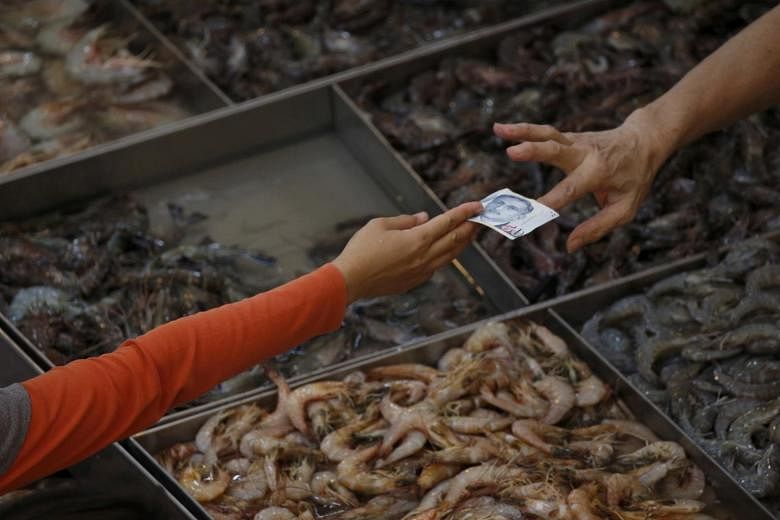Consumer prices fell again last month - the 18th straight month of decline and the longest streak of negative inflation since 1977.
The consumer price index (CPI) dropped 0.5 per cent last month from the same period a year ago, after sliding 1 per cent in March, said the Monetary Authority of Singapore (MAS) and Ministry of Trade and Industry yesterday.
The dip in the headline number was lower than the 0.7 per cent fall tipped by private-sector economists in a Bloomberg poll, partly because rebates on service and conservancy charges given out in April last year created a low base effect.
The MAS is sticking to its forecast for headline inflation to remain negative throughout the year, but some economists said the CPI could start climbing again in the next few months, albeit in a subdued range as policy measures continue to hold car prices and housing rents down.
"Any bounce in inflation is likely to be muted even with the price of Brent crude increasing by almost 25 per cent and agricultural commodities up by almost 10 per cent since the end of March," said ANZ economist Weiwen Ng.
DBS economist Irvin Seah said: "Nonetheless, CPI inflation is expected to revert to positive levels from the third quarter onwards."
Last month's 0.5 per cent fall in the CPI was already the smallest drop since July last year.
Underpinning that, the core inflation measure has ticked steadily up to hit a 13-month high in April.
Core inflation edged up to 0.8 per cent from 0.6 per cent in March, coming in stronger than the 0.7 per cent tipped by economists. Core inflation excludes accommodation and private road transport costs, to better gauge everyday expenses.
The lift in core inflation came from a rise in services inflation to 0.7 per cent from 0.4 per cent in March, due mainly to a pick-up in the costs of holiday travel and domestic services. The disinflationary effect from the national examination fee waivers effected since April last year also faded.
Food inflation edged up to 2.3 per cent from 2.2 per cent in March, on higher prices of fish, seafood and fruit. A smaller reduction in electricity tariffs also lifted core inflation.
Still, the run of falling prices, or negative inflation, is not seen as "deflation", a term reserved for a more sustained and entrenched economic problem with often dire results.
Notably, despite slower economic growth, Singapore's core inflation has not contracted at all, said UOB economist Francis Tan.
Mr Tan added: "Global consumer price actions will continue to remain subdued due to the downward pressures on the prices of major commodities as well as manufactured products."
Separately, accommodation costs fell 0.9 per cent in April, less than the 3.2 per cent drop in March and February, as the effect of last year's service and conservancy rebates offset the sharper fall in housing rents.
Private road transport costs fell at a faster pace of 7.1 per cent in April, from the same month a year ago. In March, private road transport costs had fallen 5.9 per cent.


